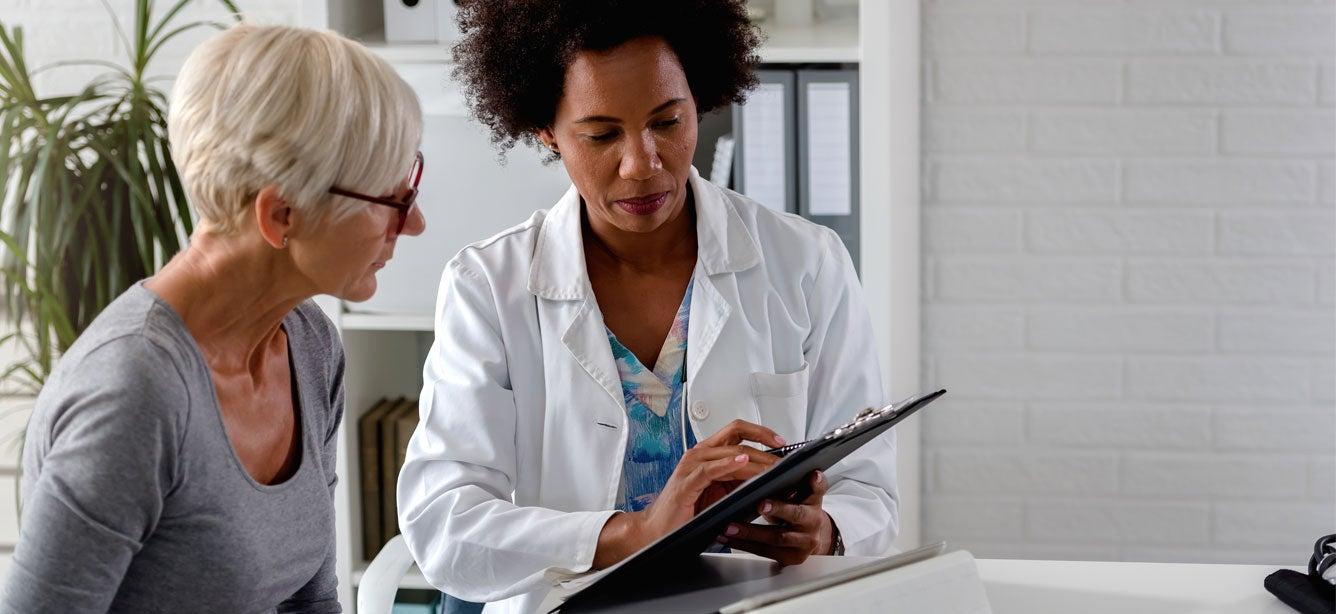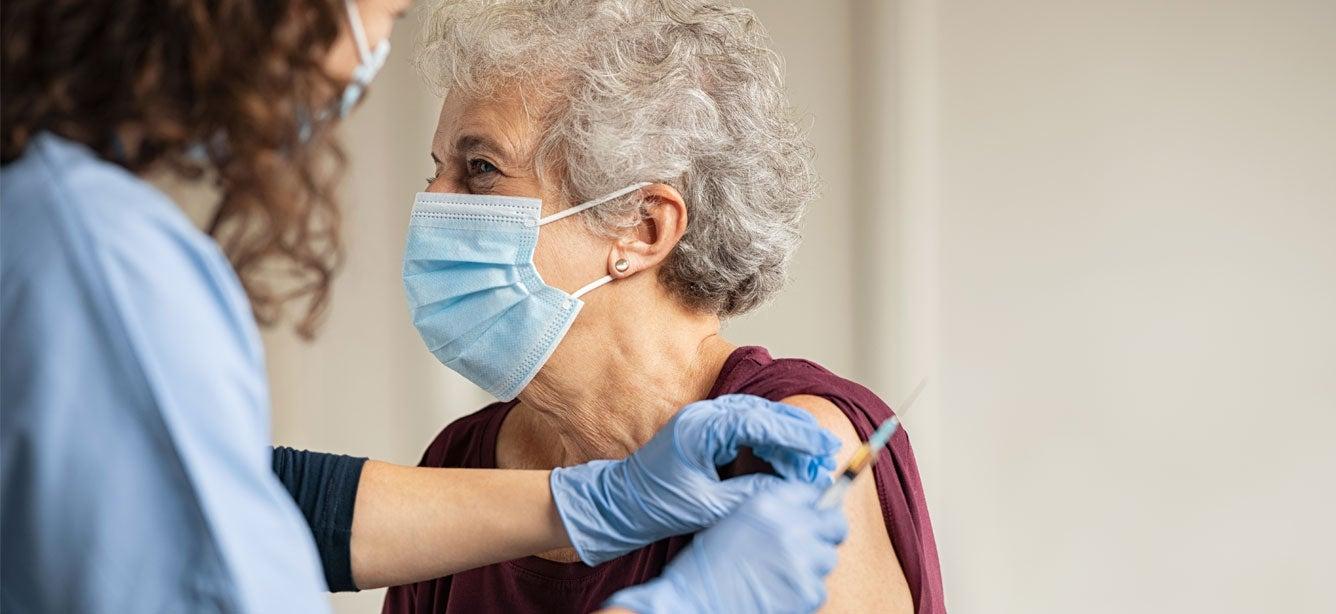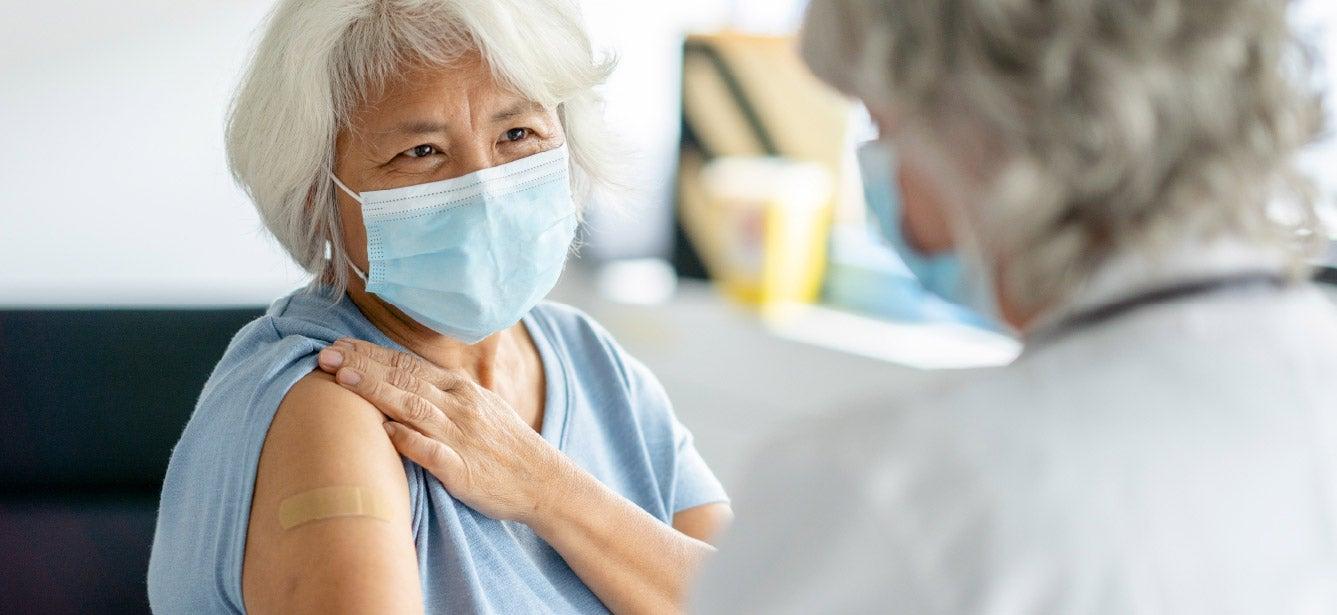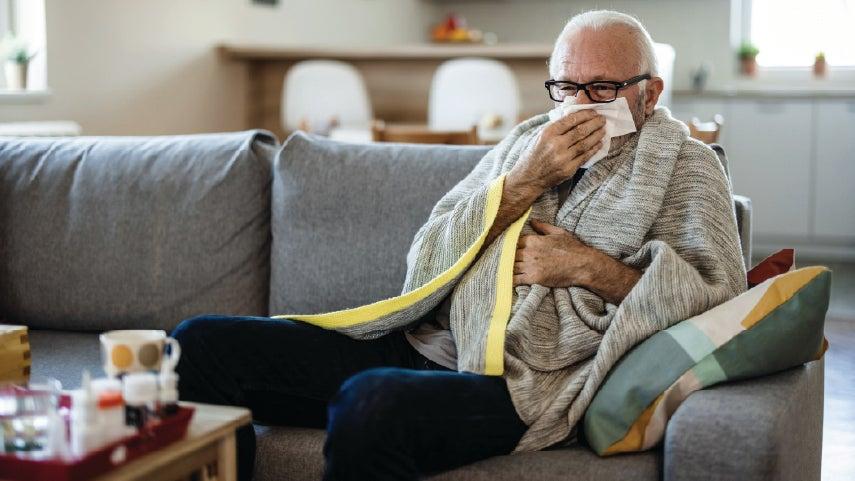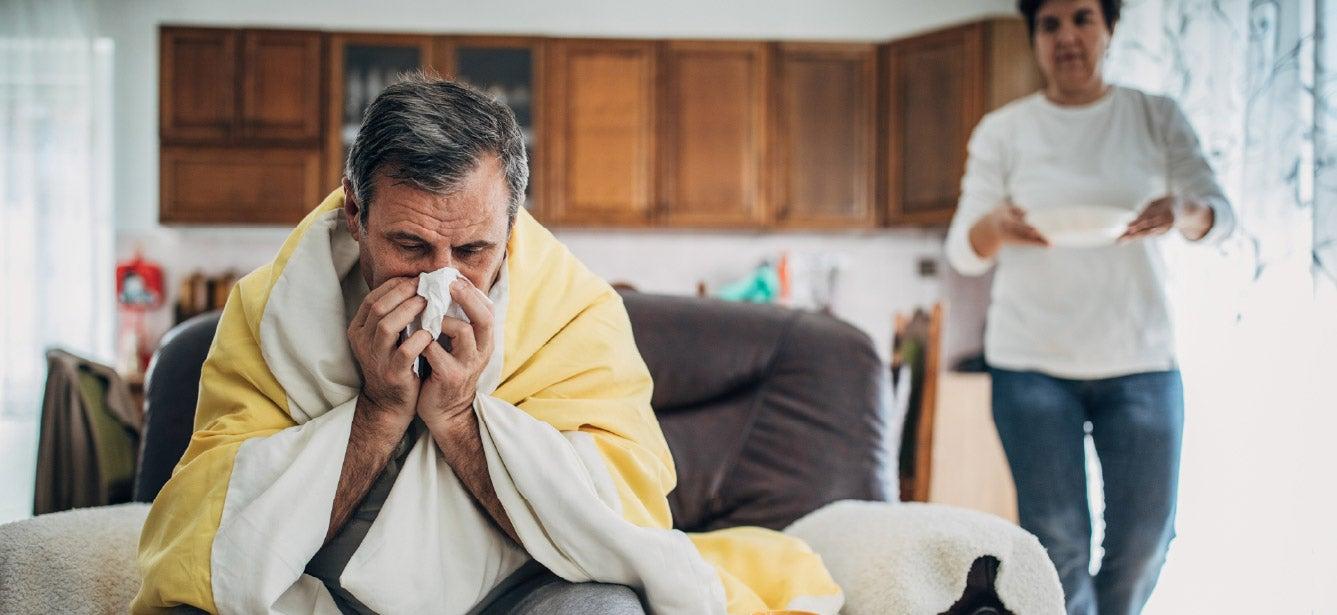
Related Topics
Each year, the cooling temperatures, falling leaves, and changing season remind us to get vaccinated against COVID-19 and the flu. But if you’re an older adult, there’s another serious health threat you should be aware of: respiratory syncytial virus, or RSV.
What age is most at risk for RSV? RSV can affect people of all ages—not just babies and young children. Each year, between 110,000-180,000 older Americans are hospitalized for RSV1 and roughly 10,000 die due to RSV complications.2
The good news is there's a vaccine available to help protect seniors who are most at risk for severe RSV disease. The Centers for Disease Control and Prevention (CDC) recommends all adults age 75+ receive the RSV vaccine, as well as people age 50-75 who are at high risk for complications from this virus.
What is respiratory syncytial virus (or RSV)?
Respiratory syncytial virus is a common respiratory virus that affects the lungs and breathing passageways. It typically causes mild, cold-like symptoms. Like COVID and the flu, RSV is highly contagious. It spreads in two main ways:
- By coming into contact (via mouth, nose, or eyes) with droplets from another person’s cough or sneeze
- By directly touching a surface that has the virus living on it (e.g., a door handle), and then touching your face
While most people recover from RSV within a week or two, some are more likely to develop serious illness and complications. This includes older adults and infants age 6 months and younger.
What are the symptoms of RSV?
RSV symptoms in adults usually start within four to six days after getting infected with the virus. Signs of infection are similar to those of a common cold and may include:
- Fever
- Runny nose
- Congestion
- Sore throat
- Sneezing
- Wheezing / barking cough
- Loss of appetite
RSV is usually diagnosed based on reported symptoms, a physical exam, and the time of year (e.g., cold and flu season). A doctor may choose to perform a mouth swab or blood test to confirm the diagnosis.
How do you know if you have COVID or RSV?
There are many respiratory viruses circulating throughout the fall and winter months, including COVID-19 and influenza. So how do you know if your symptoms point to an RSV infection—and not something else?
"It’s difficult to differentiate RSV upfront, but as the disease progresses, it becomes easier to distinguish from the flu or COVID-19," Derek Webb, PharmD, told Pharmacy Times. "Typically, patients with flu or COVID-19 present with upper respiratory symptoms initially, along with fever, body aches, chills, and similar complaints. With RSV, as the illness progresses, the symptoms are mostly lower respiratory tract related.”
A nasal or throat swab or a blood test can provide a definitive diagnosis of RSV.
Who is at highest risk for RSV?
According to CDC, adults at highest risk for RSV complications include:
- Those age 75+
- People who live in long-term care facilities (e.g., nursing homes)
- People with chronic medical conditions such as:
- Diabetes
- Heart, liver, or kidney disease
- Chronic lung disease
- Weakened immune system
- Hematologic disorders
- Neurologic/neuromuscular conditions
What are the complications of RSV in older adults?
How serious is RSV in older adults? In older adults and people with risk factors like those described above, RSV infection can worsen and lead to complications such as:
- Pneumonia and other lung infections
- Congestive heart failure
- Chronic obstructive pulmonary disease (COPD)
- Asthma
These complications may require a person to be hospitalized, and in severe cases, can lead to death.
Should everyone over 65 get the RSV vaccine?
CDC recommends the RSV vaccine for the following groups:
- All adults age 75+
- Adults age 50-74 who have risk factors for severe RSV
Three single-dose vaccines are currently approved by the U.S. Food and Drug Administration (FDA) to help prevent severe RSV in adults: Arexvy by GlaxoSmithKline (GSK), Abrysvo by Pfizer, and mResvia by Moderna. These vaccines work by triggering your body to produce an immune response that helps protect you from RSV should you be exposed in the future. If you are eligible, you can receive any of these three vaccines.
The best time to get the RSV shot is late summer and early fall, according to CDC. Unlike the flu and COVID vaccines, the RSV vaccine is not an annual vaccine. That means if you’ve already received the shot, you should not get another one right now.
Is one RSV vaccine better than the other? "The two vaccines have comparable levels of effectiveness," emergency physician Leana Wen, MD, told CNN Health. "I would get whichever one is readily available at your pharmacy or doctor’s office."
Getting the RSV vaccine should be a decision made between you and your doctor. Talk with your provider about your personal risk factors to decide if vaccination is the best option for you.
How effective is the RSV vaccine?
The RSV vaccines are reported to be highly effective in preventing severe RSV infection. A single dose of vaccine protects against RSV disease in adults age 50+ for at least two winter seasons. Pfizer's Abrysvo and GSK's Arexvy were 73-83% effective in preventing RSV-associated hospitalizations in adults age 60 and older. While Moderna's mResvia was only recently licensed for public use, clinical trials showed 80% efficacy against symptomatic RSV during the first four months after vaccination.3
For the time being, only one dose of the RSV vaccine is advised for adults. Further studies will explore whether additional doses may be beneficial.
Is the RSV vaccine safe?
The RSV vaccines are generally considered to be safe for older adults. Side effects reported after vaccination are typically mild and temporary and include swelling at the injection site, headache, nausea, fever, and fatigue. “Overall, the vaccine seems to be pretty well tolerated,” Thomas Russo, MD, a professor and chief of infectious diseases at the University at Buffalo, told Prevention. “For the most part, these side effects are what we expect with most vaccines.”
You can get the RSV vaccine at the same time as other vaccines, but be aware that this could increase any side effects you experience. Check with your doctor about whether you should wait before getting your RSV vaccine after getting a COVID or flu shot.
Does Medicare cover the RSV vaccine?
If you have Medicare Part D, your plan should cover the RSV vaccine at no out-of-pocket cost to you. This means whoever administers the vaccine should not charge you a deductible or copayment. If you decide to get this vaccine at a pharmacy, make sure the pharmacy is included in your Part D network; if the pharmacy is not in your network, they can charge you for the vaccine. If you don’t have a Part D plan, you may be charged since Medicare Part B does not provide coverage for the RSV vaccine.
If you receive your drug coverage through your employer or another provider, check your plan to see if the RSV vaccine is covered.
Where is the RSV vaccine available?
You may be able to get your RSV shot at your doctor's office, your workplace, local pharmacies, community clinics, and other locations. For more information, dial 211, reach out to your state health department, or contact organizations that support older adults and people with disabilities:
- The Aging Network: 1-800-677-1116
- Eldercare Locator: Search by ZIP code at eldercare.acl.gov
- Disability Information and Access Line (DIAL): 1-888-677-1199 or email DIAL@n4a.org
How do you prevent RSV naturally?
In addition to getting vaccinated, there are smart steps you can take every day to reduce your chances of an RSV infection:
- Wash your hands thoroughly and frequently.
- Cover sneezes and coughs (with a tissue or sleeve, not your hands).
- Avoid touching your face before washing your hands.
- Avoid close contact with people who are sick.
- Clean common surfaces often at home and/or at work.
- Stay home if you're feeling ill.
Stay healthy by staying up to date on your vaccines
Getting routine vaccinations is a vital part of aging well. “One reason for this is that we cannot fight off viruses as effectively as we age, which makes us more vulnerable to preventable illnesses like RSV, COVID-19, and influenza,” explained Dorothea Vafiadis, Senior Director of NCOA's Center for Healthy Aging. “What’s more, many older adults have underlying health conditions that increase their risk of complications from respiratory viruses. Getting vaccinated is a safe, simple way we can protect our health, independence, and quality of life.”
To learn more about the immunizations recommended for older Americans, visit our Vaccines for Older Adults resource page.
Sources
1. Centers for Disease Control and Prevention (CDC). RSV in Older Adults and Adults with Chronic Medical Conditions. Found on the internet at https://www.cdc.gov/rsv/older-adults/
2. American Lung Association. RSV in Adults. Found on the internet at https://www.lung.org/lung-health-diseases/lung-disease-lookup/rsv/rsv-in-adults
3. Centers for Disease Control and Prevention (CDC). RSV Vaccine Guidance for Adults. Found on the internet at https://www.cdc.gov/rsv/hcp/vaccine-clinical-guidance/adults.html
